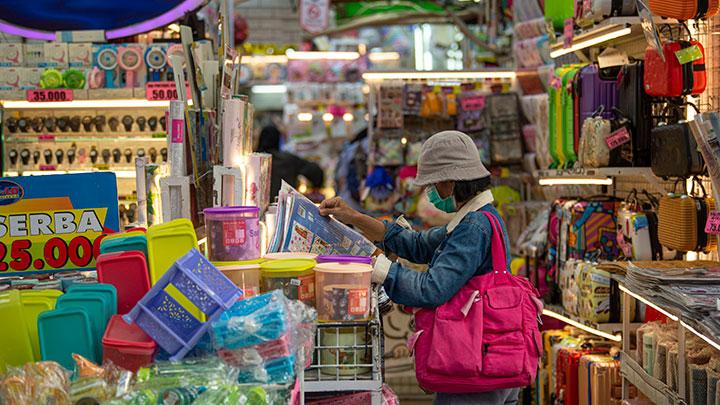TEMPO.CO, Jakarta – Indonesia faces a perplexing economic situation. Recent months have seen reports of declining purchasing power, suggesting a sluggish economy. Yet, amidst these concerns, Labubu dolls worth millions of rupiah see enthusiastic queues, pricey concert tickets sell out instantly, and the latest Apple iPhone pre-orders fly off the shelves.
What is Happening?
The Central Statistics Agency (BPS) reported deflation for five consecutive months, from May to September 2024. September’s deflation rate even reached 0.12%, up from 0.03% the previous month.
Several economists including Mohammad Faisal, Executive Director of the Center of Reform on Economics, view this as a sign of weak demand and consumption.
Shinta Kamdani, Chair of the Indonesian Business Association, expresses concern about the declining purchasing power reflected in the lower household consumption growth of the second quarter at 4.91% compared to the same period in 2023 at 5.22%.
While reports highlight economic woes, a different picture emerges from consumer behavior. Concert tickets vanish quickly, long queues form for Labubu dolls, and the latest Apple products experience high demand.
This apparent contradiction sparked a social media post by a popular account (@kegblknunfaedh) with over 12 million followers. Their post featured a handwritten note questioning the economic reality: weak purchasing power alongside people flocking to expensive items. Comments offered explanations like “doom spending” and the “lipstick effect”. Let’s delve deeper into these concepts.
Understanding Doom Spending
Doom spending refers to impulsive or excessive spending driven by stress and anxiety, according to bankruptcy curating firm Allan Marshall & Associates Inc. Several psychological factors contribute to this behavior, including the human brain’s inherent desire for instant gratification and aversion to pain.
During difficult economic times, global crises, or periods of perceived uncertainty, doom spending becomes more prevalent. The act of purchasing desired items triggers the release of dopamine, a hormone associated with pleasure, offering a temporary escape from stress and encouraging further shopping.
Social media, which often portrays a world of luxury and success, further exacerbates doom spending. Comparing oneself to others on social media platforms can lead to feelings of inadequacy and pressure to keep up with perceived expectations, ultimately driving individuals to spend beyond their means.
The Lipstick Effect Explained
According to verywellmind.com, economic downturns often lead consumers to adopt coping mechanisms, such as reducing expenses or prioritizing saving, also known as underconsumption core and the Buy Nothing movement.
However, the “lipstick effect”, a concept introduced by economist and sociology professor Juliet Schor in her 1998 book “The Overspent American”, presents a different scenario. It describes a phenomenon where people, particularly women, tend to indulge in small luxuries like lipstick during economic uncertainties.
The term “lipstick effect” was coined by billionaire and heir of Este Lauder Companies, Leonard Lauder, when he saw a surge in the company’s lipstick sales after 9/11 in 2001.
At that time, the term refers to “the propensity for women’s makeup sales to be inversely associated with the economy,” says Colleen Kirk, a consumer behavior researcher and professor of marketing at the New York Institute of Technology School of Management. In other words, when the economy sees a decline, women’s spending on makeup is shown to rise.
Though the name implies cosmetics, the lipstick effect is not limited to the beauty and cosmetic industry. It serves as a broader economic indicator studied by economists.
Lindsay Bryan-Podvin, a certified financial therapist for the Cash App mobile payment service, explains the theory as an observation that people become more cautious with expensive purchases during economic crises, shifting their spending towards affordable luxuries or small pleasures.
The Lipstick Effect in Gen Z
A 2024 Inventure survey on the 2025 Indonesia Market Outlook suggests the lipstick effect might currently be influencing Gen Z. Ironically, this survey found that 34% of Gen Z respondents had resorted to online loans or P2P lending in the past six months in September 2024.
Yuswohady, Managing Partner of Inventure, explained the Gen Z P2P lending phenomenon through the lens of the lipstick effect. He noted that economic uncertainty seems to be amplifying the lipstick effect among younger generations.
“As financial pressures mount, many Gen Z individuals seek solace in affordable luxuries like beauty products, branded clothing, or small accessories,” he said.
ADIL AL HASAN | MELYNDA DWI PUSPITA | MYESHA FATINA RACHMAN I KORAN TEMPO | TECH.CO I BLOOMBERG
Editor’s Choice: Beyond Deflation; Economist Spills 5 Indicators of People’s Lowering Purchasing Power
Click here to get the latest news updates from Tempo on Google News


